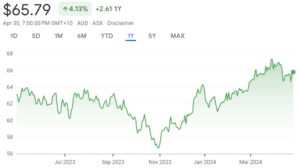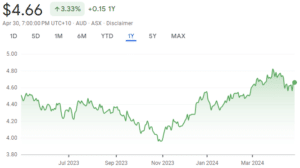3 Best Small-Cap ETFs to Buy Now for the Long term [2024]
![]() Ujjwal Maheshwari, May 2, 2024
Ujjwal Maheshwari, May 2, 2024
Australia’s investment scene is booming, and Exchange-Traded Funds (ETFs) are a big part of that. They’ve become popular because they’re cheap, offer a mix of investments, and are easy to trade. But within the world of ETFs, there’s a niche that catches the eye of those in-the-know: small-cap stocks.
Adding small-cap stocks to your portfolio mix is a smart move, and here’s why. For many investors, especially those looking to potentially grow their wealth faster, small-cap stocks offer an exciting chance.
Let’s be honest, diversifying your investments is crucial. It helps spread out your risk and keeps your portfolio balanced. Small-cap stocks can be that extra spark that helps your investments grow over time. We’re not just talking about small gains here – these companies have the potential to take off and give your portfolio a significant boost.
So, if you’re looking to add some variety and growth potential to your investments, don’t underestimate the power of small-cap stocks.
What is Small-Cap Investing?
First, let’s define what we mean by “small-cap.” In the Australian context, small-cap stocks are typically those companies with a market capitalization ranging from $50 million to $500 million. These are not your industry giants; rather, they are firms that have substantial potential for growth and expansion.
Small-cap companies are often characterized by their nimbleness and innovative capabilities. Unlike their larger counterparts, these companies are usually more focused, operate in niche markets, and can adapt quickly to new technologies or market demands. However, it’s important to remember that with great potential comes increased risk. Their smaller size can often lead to higher volatility and less liquidity.
When comparing them to mid-cap and large-cap stocks, small-caps typically offer higher growth opportunities but come with a higher risk. Large-cap companies are generally more stable, have consistent cash flows, and are seen as safer investments during turbulent times. Mid-caps, straddling the line between small and large, offer a balance of growth and stability, making them attractive in their own right.
Historically, Australian small-cap stocks have demonstrated compelling performance trends. While they experience more significant fluctuations during market downturns, their recovery and growth phases often outperform those of larger companies. This trend has been evident in various economic cycles where small-caps have provided substantial returns to those who’ve weathered the market’s ups and downs.
What are the best small-cap ETFs ASX?
Vanguard MSCI Australian Small Companies Index ETF
Investing in the Vanguard Small Cap ETF ASX provides a compelling investment opportunity, anchored by its exposure to approximately 200 small and mid-cap ASX shares. This broad exposure spans critical sectors like technology, healthcare, and resources, which diversifies risk and enhances growth potential. Analysts predict a significant growth opportunity for small caps with the expected decline in interest rates, which historically boosts investor interest in higher-risk assets.
The ETF features dynamic companies such as Webjet and Pro Medicos, which have demonstrated strong market resilience and innovation. By investing in the Vanguard MSCI Australian Small Companies Index ETF, you are tapping into the potential for substantial capital appreciation and benefitting from Vanguard’s renowned fund management expertise, making this ETF a standout choice as the best small cap ETF Australia for robust portfolio growth in the current economic climate.

iShares S&P/ASX Small Ordinaries ETF
Invest in the iShares S&P/ASX Small Ordinaries ETF (ASX: ISO) to strategically diversify your portfolio and capitalize on the growth potential of small-cap stocks. This ETF exposes you to 200 varied Australian companies, historically outperforming larger indices during economic recoveries.
With a reasonable management expense ratio of 0.55%, ISO offers a cost-effective way to invest in the small-cap market. Despite potential volatility and liquidity challenges, the consistent performance since its inception in 2010 and a solid asset base of AUD$166.5 million makes it one of the few small cap value etf australia.

Betashares Australian Small Companies Select Fund
Invest in the Betashares Australian Small Companies Select Fund (SMLL) for its strategic approach to small-cap investing. SMLL’s active management focuses on high-quality, profitable small companies, offering a potential for outperforming the market. With a lower management expense ratio of 0.38%, it keeps your costs down.
Despite its concentration risk, the skill of its fund managers has led to significant past successes, and with AUD$1.2 billion in assets and a strong track record since 2011, SMLL stands as a robust choice for targeted small-cap exposure.

Small-Cap Investing: High Risk, High Reward?
Small-cap stocks can be exciting for investors. They have the potential for explosive growth, but they also come with some big risks. Let’s dive into what you need to know about small-cap investing.
Big Potential Gains
One of the biggest draws of small-cap stocks is the chance for serious growth. Since these companies are still getting started, even a small win can mean a big jump in their stock price. Imagine a small company launches a hit product – that could send their stock price soaring! This kind of growth potential is hard to find with larger, more established companies.
Finding Hidden Gems
Because these companies are under the radar of fewer investors, there’s a chance to snag undervalued stocks. This means you could be buying into a promising company at a discount before the rest of the market catches on.
Balance
Small-cap stocks can also help balance out your portfolio. They tend to be less swayed by what’s happening in the global market compared to larger companies. This can be a good thing if you’re looking to diversify and reduce your overall risk.
The Flip Side: Higher Risk
Of course, with all that growth potential comes a big helping of risk. Small companies are inherently less stable than their larger counterparts. This means their stock prices can swing wildly, especially during economic downturns.
Limited Resources, Bigger Challenges
Small companies also have fewer resources than established giants. This can be a disadvantage. While it allows them to be nimble and adapt quickly, it can also make it harder for them to grow and compete, especially during tough economic times.
Trading Challenges
Small-cap stocks tend to have fewer shares available for trading. This can make it trickier to buy and sell them at the price you want. You might also end up paying higher fees for these transactions.
The Bottom Line
Small-cap stocks can be a great way to add some growth potential to your portfolio. But remember, they come with extra risk. Before you dive in, be sure you understand the risks involved and are comfortable with some volatility.
Should I Invest in Small-Cap Stocks?
Factors to Consider Before Investing
Deciding whether to invest in small-cap stocks isn’t a decision to take lightly. You need to consider several factors:
- Risk Tolerance: Small-cap investments can be volatile. If market swings keep you up at night, these might not be for you.
- Investment Horizon: Long-term investors can weather the volatility and reap potential growth. If you’re looking at a shorter timeline, the inherent risks might outweigh the benefits.
- Financial Goals: What are you aiming to achieve? High growth, diversification, or perhaps a mix of both?
Role of Small-Cap Stocks in a Balanced Portfolio
Small-cap stocks can play a crucial role in a well-rounded portfolio by providing growth potential that large-cap stocks may not offer. They are particularly useful for investors looking to boost portfolio growth and who are comfortable with higher risk. The key is balance—ensuring these more volatile investments are part of a diversified portfolio that can absorb potential shocks.
How to Invest in Small-Cap ETFs
Steps to Purchase ETFs
- Choose a Brokerage: First, you’ll need a brokerage account. There are many platforms available, so choose one that aligns with your investment needs in terms of fees, ease of use, and customer support.
- Research Small-Cap ETFs: Look for ETFs that align with your investment criteria. Key metrics to consider include fund size, expense ratio, and historical performance.
- Execute the Trade: Once you’ve made your choice, purchasing the ETF is as simple as placing an order through your brokerage platform.
Considerations for Long-Term Versus Short-Term Investing
- Long-Term: Investing for the long term helps mitigate the risk of volatility. Small-caps, with their growth potential, are well-suited for this approach.
- Short-Term: Short-term investments in small-caps can be riskier. They’re susceptible to market fluctuations, which can be more pronounced in the small-cap universe.
Tax Implications and Fees Associated with ETF Investments
Understanding the tax implications and fees is crucial. ETFs are subject to capital gains tax. Additionally, be aware of fees such as expense ratios and brokerage fees, which can impact your overall returns.
Conclusion
We’ve seen that small-cap ETF ASX offer substantial growth potential but come with a higher level of risk and volatility. These investments can significantly enhance a diversified portfolio, yet they demand a robust risk management strategy.
Including small-cap ETFs in your investment portfolio can be a strategic move. Remember, the key to success in investing is not just choosing the right assets but managing them wisely over time.
What are the Best ASX Stocks to invest in right now?
Check our buy/sell tips
Blog Categories
Get Our Top 5 ASX Stocks for FY25
Recent Posts
Top 10 ASX Dividend Stocks to Watch in June 2025
As investors, one of the most attractive features of the Australian Securities Exchange (ASX) is its long-standing reputation for dividend-paying…
From Explorer to Producer: Greatland Gold’s Strategic Evolution
Greatland Gold has long been associated with promising exploration projects across some of the world’s most mineral-rich regions. However, in…
Battery Age Minerals (ASX:BM8) hopes for a Golden Age from one of the biggest sources of Kerry Packer’s wealth
Last November, our colleagues at Pitt Street Research introduced you to Battery Age Minerals (ASX:BM8), whose potential company-maker is an…



